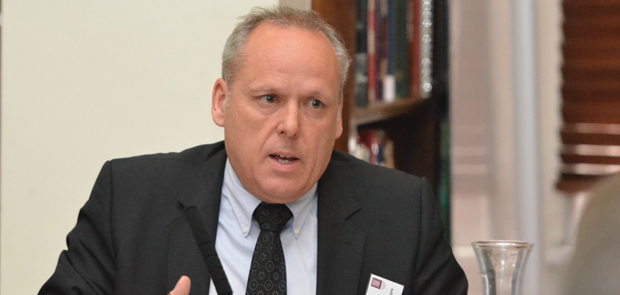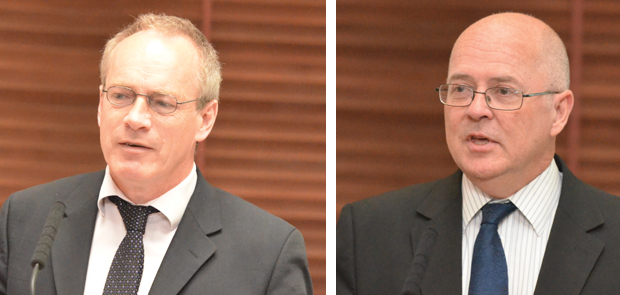The new teaching and training qualifications for the FE sector dominated discussion at the latest Westminster Education Forum last Thursday. Shane Mann reports
Changes in sector regulations were outlined in the Learning and Skills Improvement Service (LSIS) report last month entitled Teaching and Training Qualifications for the Further Education and Skills Sector in England.
It also introduced new teaching qualifications that awarding organisations and higher education institutions are devising for introduction in September.
Discussion of these changes and what they mean for teaching standards were examined by an FE sector panel made up of Martin Doel, chief executive of the Association of Colleges, Rob Wye, LSIS chief executive, Norman Crowther, the Association of Teachers and Lecturers’ national official for post-16 education, Ian Pryce, principal and chief executive, Bedford College and Sue Crowley, chair, non-executive board, Institute for Learning (IfL).
Mr Wye started the session by discussing the changes.
“It is clear from our research that excellent teaching and learning is dependent on excellent teacher training and excellent additional CPD,” he said.
“One of the findings in the Lingfield review was that the structure of qualifications for teachers and trainers was too complex; that it needed revisiting and reformulating. LSIS has undertaken this work in recent months and has found that what employers actually wanted was a simple structure that meets their needs. That is what has been developed.”
Mr Doel commended LSIS for its work, saying: “Teaching standards and qualifications are not an end in themselves.
Martin Doel, chief executive of the AoC
“I think they’re actually a very useful thing, but I do believe that they don’t need to be mandatory. I am certain that the guild will take LSIS’s work forward on that basis. The flexibility of the qualifications produced is useful as a benchmark to aim for, and for employers.”
He added that teaching qualifications “do not produce nor guarantee good teaching and student outcomes”.
“Good teaching is necessary but not a sufficient condition for guaranteed good student outcomes,” he said.
“It’s a pre-eminent part of what colleges and providers could and should provide in terms of good student outcomes.
“There is a difference between occupational and professional expertise as a teacher. There are complex support systems within colleges — learner tracking, engagement of industry and knowledge management — which are all important and critical to student outcomes.”
I want my students to be taught by the most skilled people that I can find”
Ms Crowley said that practitioners wanted teaching qualifications to remain mandatory.
“We consulted widely with our membership and they were clear that they want an entitlement to teacher qualifications and they would be happy that regulations were maintained,” she said.
“It’s important that we think about whether you need to be qualified. How will those that come in to the profession feel when working alongside those that have qualifications? Will they have a second-class status? I don’t know of another profession where regulations for qualifications have been revoked. It’s quite remarkable.”
However, Mr Pryce argued that the sector should focus more on the vocational skill of the individual; whether a candidate could teach or not should be up to individual organisations, not the government.
“I want my students to be taught by the most skilled people I can find, I don’t want the government to be involved at all because the quality of my staff is a matter for my organisation and it’s a source of competitive advantage,” he said.
“The idea that the government tells me I can employ people that have certain qualifications actually offends me. The government should look at our outputs not our inputs.
Rob Wye, LSIS chief executive and Ian Pryce, principal and chief executive, Bedford College
“I also don’t understand why the taxpayer should be expected to fund professional qualifications for teachers. And why we allow awarding bodies that are not professional teaching bodies to create them. We need to be attractive to those highly skilled bricklayers and engineers and have to be able to convert people from industry into teaching without them losing time or money. That dual professionalism is the jewel in our crown.
“In our sector we have a compliance model of continuing professional development, whereas the Quality Assurance Agency talks about scholarly activity and people doing research. It’s a continuum and we’re on the wrong end. We’re fixated at the CPD end, we’ve got to shift that focus and stop counting hours.”
Featured image caption: Sue Crowley, chair, non-executive board, Institute for Learning



It is quite extraordinary that, in a sector (further education) which depends upon other sectors – industry, business, volunteering, etc – having standards and qualifications, colleges and their representative body have taken the position that the same should be denied for its professionals. It is the most remarkable juxtaposition for further education, but investing in teacher education leaves a negative entry on the balance sheet and in all my dealings with FE employers in this regard it was clear that the financial considerations came much higher up the organisational priority list than the consequences for teaching and learning.
Some years ago, I spoke at a national teaching standards and qualifications conference with Mr Pryce. His position on teaching qualifications then was the same. We disagreed with each other, strongly. I particularly disagreed with Mr Pryce’s characterisation of FE teaching. He chose a picture (http://images2.myreviewer.co.uk/medium/0000218681.jpg) to represent his take on the professions; you will recognise it as being the classic class sketch from the Frost Report. The characters represented the staff of his college. The Cleese character was his senior post-holders, particularly his finance staff, who of course had to be qualified. The Barker character identified with roles such as HR, where again qualification was important. The Corbett character, yes you’ve got it, represented his teachers, where Mr Pryce was the only one to be in a position to determine their status and he made it quite clear that he had little time for a system that required teachers to be qualified. Mr Pryce’s background, should you not know it, is finance, having been Finance Director of Bedford College and was previously a regional Finance Director at the Further Education Funding Council.
Professional status in further education was hard won and was quickly eroded as unions and the AoC retreated to type in using professionalism as the battleground for their continuing war. As My Pryce is quick to point out, the ‘real professions’ are set apart through standards and qualifications. Try getting any finance position without qualifications commensurate with the level of the role. Employers denying this for FE teachers is part of a strategy to define teaching as a workforce, rather than as a profession and should shock any FE leader who truly values teaching and learning.
Mr Doel and Mr Pryce suggest that, in recruiting FE teachers, they are hamstrung by a system where teaching qualifications are mandatory. They are not. Colleges and other FE providers, whose voice is strangely absent in this debate, are free to choose whoever they like to teach, so long as the subject expertise is in line with the expectations of the awarding body for the qualification being taught. The system simply expects that new teachers are supported in the early part of their teaching career and that this support should include progression towards an appropriate teaching qualification. So Mr Pryce IS free to employ the bricklayer or engineer of his choice, nothing in the system prevents him from doing so.
One can only conclude that the real issue for colleges, as the employers of teachers, is the fact that supporting new teachers to achieve professional qualifications costs money. I’ll say it again. Here is a sector that only exists because bricklayers, plumbers, hairdressers, engineers, caterers, etc need qualifications to do the jobs that they do. If it were not so, colleges up and down the country would quickly disappear. FE leaders have a duty and a moral obligation to lead by example; nowhere is that more important than in ensuring that their recruitment strategies and support for initial and continuing professional development are of the highest standard. Sadly being an exemplar for standards and qualifications is repeatedly sacrificed on the altar of the balance sheet and that is a great tragedy.
It is very disappointing that the article does not give all of the views expressed in this important exchange of views. Having given the view that the proposed deregulation of teaching qualifications in the FE sector is a retrograde step and in contradiction to a high quality and forward looking sector, I am concerned that FE Week considers this a balanced report of the event. While the views expressed by Sue Crowley generally agreed with the position I set out, they did not emphasise, nor address, the critical juncture we now face post deregulation: whither professionalism now?